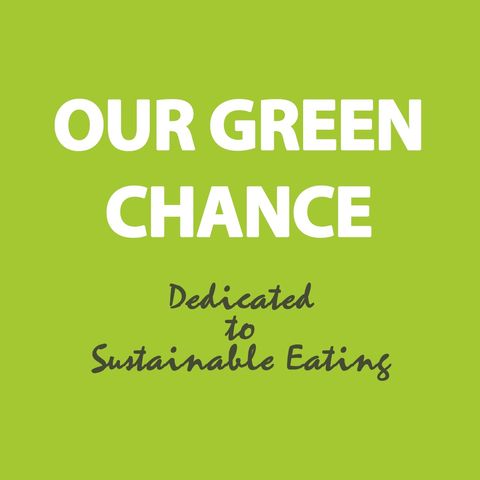Joint action to lower emissions - Plant-based, real food and planetary health

Download and listen anywhere
Download your favorite episodes and enjoy them, wherever you are! Sign up or log in now to access offline listening.
Description
Some key points: 0:08 We all are key players in generating the future's sustainable food environment 0:38 Link among climate emergency, overconsumption and food related activities 1:09 The power of...
show more0:08 We all are key players in generating the future's sustainable food environment
0:38 Link among climate emergency, overconsumption and food related activities
1:09 The power of the individual and its limit to lower emissions
1:20 Making responsible decisions in environmental sense should not be only the duty of individuals
1:27 We lack of time in decreasing emissions sufficiently fast; However individuals' effort is essential it might be too slow
1:49 World's Food Systems are responsible for more than one third of the global anthropogenic greenhouse gas emissions;The mayor role of agricultural land use and production
2:12 Need of reducing nitrous-oxide and methane ‐ which are both emitted mainly by agriculture - could mean a huge advance in climate change mitigation
3:00 Food transportation has a much lower effect on transportation than we normally attribute to it and even much lower when we compare it to livestock and its related activities (eg. deforestation, land used to produce food for animals). Local and relatively local food do not lead necessarily to lower emission and especially not across different food groups
3:55 What is the reason why livestock has an impact on a much larger scale than other food sources? Comparing agriculture and food in general to other non-food related sectors seems disproportionate , however these two still seem to be responsible for the most emissions
4:57 Deep reductions in methane (as well as in nitrous oxide) will be necessary to help limit global warming to 1.5°C or 2°C. “The unlikelihood of achieving a rate of decarbonization sufficiently fast means the world faces a global temperature increase that will rise above 1.5°C. Every fraction of additional warming above 1.5°C will bring worsening impacts, threatening lives, food sources, livelihoods and economies worldwide.” (UNEP)
5:26 Reflections concerning the consumers impact power on our food systems; Active participation of entrepreneurs is and will be also undoubtedly crucial
6:22 Climate change and related extreme events will significantly increase ill health and premature deaths; Climate-sensitive food-borne, water-borne, and vector-borne disease risks are projected to increase putting additional billions of people at risk by the end of the century
7:18 Reflections - The lack of nonacceptance of having big scale livestock; The relatively unchanged demand for impactful animal products; Clear facts on the benefits of wholesome plant-based diet in contrast to today’s commonly realized unhealthy and environmentally impactful eating patterns.
9:22 “If the world adopted a plant-based diet (thanks to our joint effort) we would reduce global agricultural land use from 4 to 1 billion hectares (by 75%). This large reduction of agricultural land use would be possible thanks to a reduction in land used for grazing and a smaller need for land to grow crops.” (Our World in Data)
9:48 Certification: Bio, Eco, Organic; Lack of guarantee that a food certified by this system will have fewer associated emissions and fewer resources used for its production. In extreme cases, the most unsustainably produced plant is still more sustainable than the most sustainably produced animal product.
11:41 High-impact production produces just 25% of our protein, but 70% of its emissions. The top quarter of protein production emits more than the EU’s total annual greenhouse gas emissions from all sectors. (Our World in Data)
12:16 Restaurants with good intentions in an environmental sense, if you want to lower emissions to the highest degree possible throughout the meals you provide, offering plant-based menus and meals are the most effective ways to do so.
13:52 Cutting out animal products partly or totally from what we produce, process, promote, transport and sell. Concerns: Discriminatory? Risk workplaces and income for families? Food insecurity?Urgent need to invest in the global accessibility of wholesome plant-based food options. A gradual transition, through well thought and gradually imposed rational measurements, retraining and decent contribution for each participant in the food chain.
15:13 The true willingness for reaching environmental sustainability in many companies is still quite questionable. Say no to Ultra-processed - be coherent if you are truly concerned about sustainability. The misleading highly processed food approach as a form of being vegan or environmental friendly or promoting this way of eating by any business activity.
17:20 Do you know how to identify ultra-processed foods in general and when they are already on your plate? “If we keep following this model of eating ultra-processed products, the advantages that eating more legumes and vegetables used to mean could gradually begin to disappear.”
19:08 Without health, there is no sustainable future (either economically). Ultra-processed food consumption contributes to the existence and increase of non-communicable diseases (NCDs) through its negative impact on the diet; The economic burden of NCDs is on the rise and is projected to show steeper increases in the future; Dietary factors make the largest contribution to the risk of CVD (Cardiovascular disease) mortality and CVD DALYs at the population level across Europe of all behavioural risk factors. (European heart network)
25:36 Key characteristics that makes ultra processed food unsustainable from environmental and health aspects.
27:57 Let us take as much responsibility as we can in the matter! If we will be able to face these tough times, we will be able to do it | only | together.
Information
| Author | Our Green Chance |
| Organization | Our Green Chance |
| Website | ourgreenchance3.wixsite.com |
| Tags |
Copyright 2024 - Spreaker Inc. an iHeartMedia Company
